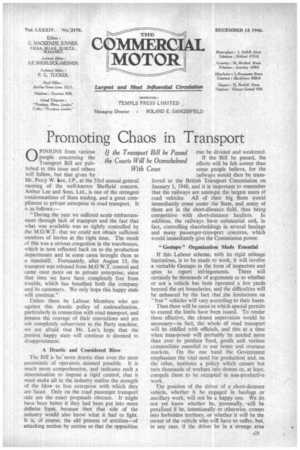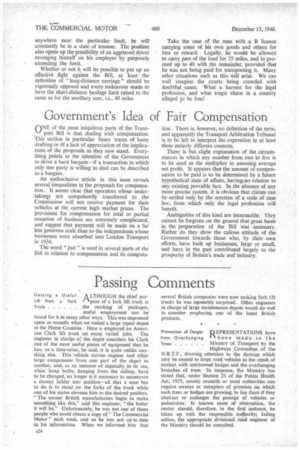Promoting Chaos in Transport
Page 25

Page 26

If you've noticed an error in this article please click here to report it so we can fix it.
0 PINIONS from various people concerning the Transport Bill are published in this issue and others will follow, but that given by ' Mr. Percy W. kee, J.P., at the 53rd annual general meeting of the well-known Sheffield concern, Arthur Lee and Sons, Ltd., is one of the strongest -condemnations of State trading, and a great compliment to private enterprisein road transport. It is as follows:— " During the year we suffered acute embarrassment through lack of transport and the fact that what was available was so tightly controlled by the M.O.W.T. that we could not obtain sufficient numbers of lorries at the right time. The result of this was a serious congestion in the warehouses, which in turn reflected back on to the production departments and in some cases brought them to a standstill. Fortunately, after August 15, the transport was released from M.0 W.T. control and came once more on to private enterprise: since that time we have been completely free from trouble, which has benefited both the company and its customers. We only hope this happy state will continue."
Unless there be Labour Members who are against this drastic policy of nationalization, particularly in connection with road transport, and possess the courage of their convictions and are not completely subservient to the Party machine, we are afraid that Mr. Lee's hope that the present happy state will continue is doomed to disappointment.
A Drastic and Considered Blow The Bill is far more drastic than even the most pessimistic of operators deemed possible. It is much more comprehensive, and indicates such a determination to impose a rigid control, that it must make all in the industry realize the strength of the blow to free enterprise with which they are faced. Only on the road passenger transport side are the exact proposals obscure. It might have been better if they had been put into more definite form, because then that side of the industry would also know what it had to fight. It is. of course, the old process of attrition—of attacking section by section so that the opposition can be divided and weakened.
If the Bill be passed, the effects will be felt sooner than some people believe, for the railways would then be transferred to the British Transport Commission on January I, 1948, and it is important to remember that the railways are amongst the largest users of road vehicles. All of their big fleets would immediately come under the State, and many of them are in the short-distance field, thus being competitive with short-distance hauliers. In addition, the railways have substantial and, in fact, controlling shareholdings in several haulage and many passenger-transport concerns, which would immediately give the Commission power.
" Gestapo " Organization Made Essential If this Labour scheme, with its rigid mileage limitations, is to be made to work, it will involve a veritable Gestapo in the form of inspectors and spies to report infringements. There will certainly be thousands of arguments as to whether or not a vehicle has been operated a few yards beyond the set boundaries, and the difficulties will be enhanced by the fact that .the limitations on " free " vehicles will vary according to their bases. Then there will be cases in which special permits to exceed the limits have been issued. To render these effective, the closest supervision would be necessary—in fact, the whole of road transport will be riddled with officials, and this at a time when man-power will probably be needed more than ever to produce food, goods and various commodities essential to our home• and overseas markets. On the one hand the Government emphasizes the vital need for production and, on the other, institutes a policy which cannot but turn thousands of workers into drones or, at least, compels them to be occupied in non-productive work.
The position of the driver of a short-distance vehicle, whether it be engaged in haulage or ancillary work, will not be a happy one. We do not yet know whether he, personally, .will be penalized if he, intentionally or otherwise, crosses into forbidden territory, or whether it will be the owner of the vehicle who will have to suffer, but. in any case. if the driver be in a strange area anywhere near the particular limit, he will constantly be in a state of tension. The position also opens up the possibility of an aggrieved driver revenging himself on his employer by purposely exceeding the limit.
Whether or not it will be possible to put up an effective fight against the Bill, at least the definition of "long-distance carriage" should be vigorously opposed and every endeavour made to have the short-distance haulage limit raised to the same as for the ancillary user, i.e., 40 miles. Take the case of the man with a B licence carrying some of his own goods and others for hire or reward. Legally, he would be allowed to carry part of the load for 25 miles, and to proceed up to 40 with the remainder, provided that he was not being paid for transporting it. Many other situations such as this will arise. We can well imagine the courts being crowded with doubtful cases. What a harvest for the legal profession, and what tragic chaos in a country alleged /c) be free!












































































